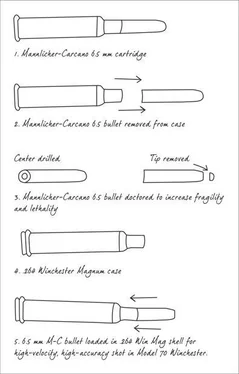Stephen Hunter - The Third Bullet
Здесь есть возможность читать онлайн «Stephen Hunter - The Third Bullet» весь текст электронной книги совершенно бесплатно (целиком полную версию без сокращений). В некоторых случаях можно слушать аудио, скачать через торрент в формате fb2 и присутствует краткое содержание. Жанр: Триллер, на английском языке. Описание произведения, (предисловие) а так же отзывы посетителей доступны на портале библиотеки ЛибКат.
- Название:The Third Bullet
- Автор:
- Жанр:
- Год:неизвестен
- ISBN:нет данных
- Рейтинг книги:5 / 5. Голосов: 1
-
Избранное:Добавить в избранное
- Отзывы:
-
Ваша оценка:
- 100
- 1
- 2
- 3
- 4
- 5
The Third Bullet: краткое содержание, описание и аннотация
Предлагаем к чтению аннотацию, описание, краткое содержание или предисловие (зависит от того, что написал сам автор книги «The Third Bullet»). Если вы не нашли необходимую информацию о книге — напишите в комментариях, мы постараемся отыскать её.
The Third Bullet — читать онлайн бесплатно полную книгу (весь текст) целиком
Ниже представлен текст книги, разбитый по страницам. Система сохранения места последней прочитанной страницы, позволяет с удобством читать онлайн бесплатно книгу «The Third Bullet», без необходимости каждый раз заново искать на чём Вы остановились. Поставьте закладку, и сможете в любой момент перейти на страницу, на которой закончили чтение.
Интервал:
Закладка:
Finally, Bob was done. He had come across no oddities, no irregularities, no anomalies. It was just a serious reader’s collection of the best his species had done at the ridiculous effort of telling a long story in prose.
“How’re you coming?” asked Harry, leaning in the doorway.
“I suppose it was a game try, but I didn’t learn a damned thing I didn’t already know, except that the world is sadly full of books I’ll never read.”
“This room makes me feel the same way. I–” He paused. “This probably has nothing to do with anything,” he went on, “but I did find one book hidden away when I was searching. It was nonfiction, old, a first edition. It was strange for Dad to have, and he’d hidden it in the bedroom, in his nightstand, under a pile of magazines. What did I do with it?”
Swagger waited as the internal drama played out in Harry’s head.
“I thought it might be valuable, so I set it aside for an appraisal and then never–” He snapped alert. “Wait here. I put it in the attic, where I have some of Dad’s old suits that I’ve been meaning to give away.”
He turned, and Swagger heard the echoes in the old house as the man bounded up the stairs two flights, then bounded back.
He walked in with his trophy.
“Some kind of obscure Victorian science book, though the author’s name is slightly familiar; I can’t remember from where.”
He handed the heavy volume to Bob. It was The Visions of Sane Persons by Francis Galton. It weighed about three tons.
Swagger turned to the title page and saw that it had been published in 1884.
“It’s got a bookmark,” said Harry.
Swagger cracked the old volume to the page that, sometime in the distant past, Niles Gardner had designated as of special meaning, and found himself at the intersection of pages 730 and 731, where he began to read Frances Galton’s comments on numbers and colors.
I’ll spare you details on the weekend and the pitch I made to Lon and his eventual acceptance. As you may have gathered, I would make a later, tougher pitch to Lon, and that was the dramatic one. I’ll detail it at the proper time.
To sum up, Peggy and I got there around 5, had cocktails, and took him to dinner at his country club, where all knew and loved him. The food was excellent, and he was in good spirits. I could tell the intellectual exercise of solving the problem had energized him. The next morning, he and I went out to his range, and he showed me the rifle he had prepared and the ammunition, and convinced me that it was fine, that it would work. I suppose he knew what would come next. He displayed no surprise at the course the conversation took.
Lon was a big man. That’s why he played fullback; ask the Harvard pansies, they know him well. He watched his weight and worked out his upper body with dumbbells regularly, but he was always fighting the pounds; they seemed to creep on him like fog and cling like putty. He had a square American face, wore wire-rimmed glasses, and kept his hair short, like all of us did without question in 1963. He favored corduroys, chinos, and crewneck sweaters, all well worn, so that he looked like an English professor – again, like we all did in those days. You were an English professor in a rumpled sport coat or an IBM salesman in a sharp dark suit and black tie. That was all there was.
His face was so lively and intelligent that people oftentimes didn’t realize he was moored in that hateful steel chair, S4 forever. He’d gotten awfully good with it over the years, and he may have been the one who invented the wheel ring of smaller circumference than the rubber tire he used to propel himself. He could probably climb a mountain in the thing, or rob a bank, or go up or down stairs. But it got to him, I know it did. His vitality crushed into that metal framework, his liveliness anchored by the great dead wastage of his lower body, his talent frustrated by his immobility.
It took a bit, as it always does when you recruit a solid citizen to go against all that he’s been taught, but I had advantages. I knew he read Lippman in the Post and admired Murrow on CBS and had what might be called “enlightened” social ideas about Negroes and Jews, and while he wanted to destroy communism, he didn’t particularly want to kill anyone doing it, especially not millions of innocent Russian peasants. We all felt that way. And he hated, as did most Ivy League people, General Walker, who seemed part of a long tradition of recent American troglodytes, from Martin Dies to Joe McCarthy to Richard Nixon to the John Birch Society and the Ku Klux Klan, men who saw Commies everywhere and made it much tougher on those of us charged with fighting real Commies, men who hated Negroes and wished them to stay backward and pathetic and never equal under law or in opportunity, men who still hated Jews and thought they secretly controlled everything, men who just hated because that was all they had been taught to do.
When I explained my fears that Walker’s right-wing pressure might force the callow and decadent JFK into doing another stupid thing, this time a stupid tragic thing, and assured Lon there was no chance whatsoever of being caught and laid the plan out for him, he finally agreed. Let it be known here and now that he never asked for a cent, he never got a cent, he never discussed a cent. He did it because I convinced him that it was the right thing to do, and he believed in me.
There was some logistics planning to be done, but that’s always a task at which I excel. I got a big chunk of operating funds out of the black budget by my usual means, bought each of the tickets at a different travel agency, paying cash, booked rooms for us from the nineteenth to the twenty-sixth at the Adolphus under fake names – easily done in those precomputer days – used a fellow in the gray economy who did a lot of intelligence trade work to put together fake driver’s licenses for the three of us, and made sure everything was delivered and nothing was written.
I had my own career to tend to, so I worked extra-hard in the meetings and at appending notes to reports and keeping Cord up-to-date on PEACOCK and the like. I was busy, or at least I gave the impression of being busy. My one worry was that Kennedy would make another mistake and we’d find ourselves on crisis footing and stuck in weeks of eighteen-hour days while the grown-ups at State worked out ways to prevent him from ending the world in fire. I guess those midweeks in November, he was busy screwing Cord’s ex-wife, Marilyn, Angie, and everybody except poor forlorn Jackie, when he wasn’t plotting his next campaign. He didn’t seem to do much except think about his career and wait for things to happen. It was that hunger that killed him: the trip to Dallas was strictly politics and had nothing to do with his actual job as president.
In any case, I sold Cord, who had seemed hazier and more morose of late and perhaps was drinking more than he should, as his nose was turning into a big red blob, on another PEACOCK trip – this time, to make it easier on myself, to the south. The idea was to hit the prestige North Carolina schools, like Duke and Wake Forest and the University of NC, and spend a week trolling for talent down there. For some reason, North Carolinians always did well in prestige journalism circles, possibly because, although they were Southern, they weren’t too Southern. From my point of view, the hop to Dallas from Raleigh and back was much easier and less exhausting or time-consuming than the one to Dallas via Cambridge.
The night came when Lon, Jimmy, and I met as a team for the first time. It was November 19, 1963. I had rented a Jeep Wagoneer, and the three of us drove from the Adolphus, a grand hotel that bathed in the red glow of the neon pegasus atop the Magnolia Petroleum Company next door, out to the Patio and got acquainted, first with one another and second with the field upon which our operation would transpire. It was a good trip. Jimmy and Lon bonded instantly, and it was understood, without having to be explained, that Jimmy would be the action guy, the assister, Lon’s special friend. Lon would shoot; he was the artist, the special talent, who made the thing work. I would supervise, though discreetly, more by studiously considered suggestion than direct order; I would also handle everything organizational, logistically and strategically. It was a good healthy dynamic. There is no I in “team,” or so they say, and for the three of us, it was true.
Читать дальшеИнтервал:
Закладка:
Похожие книги на «The Third Bullet»
Представляем Вашему вниманию похожие книги на «The Third Bullet» списком для выбора. Мы отобрали схожую по названию и смыслу литературу в надежде предоставить читателям больше вариантов отыскать новые, интересные, ещё непрочитанные произведения.
Обсуждение, отзывы о книге «The Third Bullet» и просто собственные мнения читателей. Оставьте ваши комментарии, напишите, что Вы думаете о произведении, его смысле или главных героях. Укажите что конкретно понравилось, а что нет, и почему Вы так считаете.












